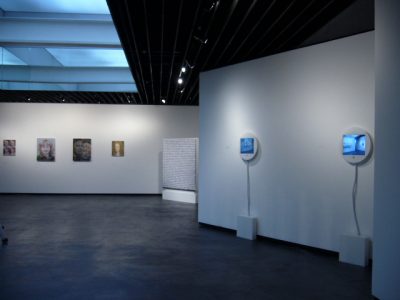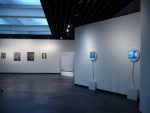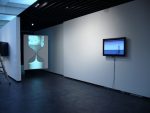bitforms gallery is pleased to announce its second solo exhibition with New York-based artist Daniel Rozin. This exhibition presents his latest explorations using the mirror and is accompanied by a 20-page color catalog published by the gallery. The work will travel to bitforms gallery’s new exhibition space in Seoul, Korea January 2006.



Daniel Rozin
Sculpture & Software Art Installations
September 15, 2005 – October 15, 2005
bitforms gallery is pleased to announce its second solo exhibition with New York-based artist Daniel Rozin. This exhibition presents his latest explorations using the mirror and is accompanied by a 20-page color catalog published by the gallery. The work will travel to bitforms gallery’s new exhibition space in Seoul, Korea January 2006.
For more than a decade Daniel Rozin has been creating interactive sculptures from a wide range of materials including shiny chrome spheres, flat wood panels, computer software, and city trash from the streets of New York. As an industrial designer by training, Rozin creates interactive objects with ingenious craftsmanship. Some of his pieces employ hundreds of tiny motors, despite the fact that technology in his work usually remains invisible.
This show marks the debut of Rozin’s Circles Mirror, a black and white kinetic collage of more than 800 laminated prints. Motion-sensitive concentric patterns create dazzling gradients of grey that wear the stamp of 1960s Op Art. The mirrored image produced in this work is activated by software authored by Rozin that processes video signals and breaks up imagery geometrically, seemingly pixel by pixel.
Software art that links screen-based performance with real-time video processing has been the focus of Rozin’s efforts since the mid-1990s. In the exhibition are four software mirrors from Rozin’s Time series, which speak about the influence of experience on perception. Each of the four mirrors employs a different algorithm that fuses visuals of the immediate past with actions from the present. All displayed on separate LCD screens, Time Scan, Time Ripples, Hourglass and Shaking Time float visual moments into a rich matrix of time. Stunning textures result with Shaking Time, in which color video motion flakes off layers of static black and white imagery from a time-delayed past. Mirrored information filters effortlessly, and ripples continuously with a dance of renewal. Also in the exhibition is Self-Centered Mirror, a ten-foot arrangement of 34 vertical mirrored panes, which physically illustrates the narcissistic gaze that is usually associated with mirrored reflection.
Rozin’s Trash Mirror will be part of bitforms gallery’s inaugural exhibition at a new space in Seoul, opening September 30. Other recent exhibitions of Rozin’s work in the past year include MUSAC in Spain, Taiwan National Museum of Fine Arts, Jamaica Center for Arts in New York, ARCO ‘05, and Zman Laomanut in Tel Aviv. He has had solo exhibitions at bitforms gallery in New York, the Israel Museum, and John Michael Kohler Art Center in Wisconsin. His work has also been included in group exhibitions at Ars Electronica in Linz, Art Interactive in Cambridge, Lincoln Center, ICC in Tokyo, The American Museum of the Moving Image, the Markle Foundation in Rockefeller Center, SIGGRAPH, Media City Seoul 2000, New York University, Interaction-99 in Ogaki City in Japan, and Threadwaxing Space.
Rozin’s work has been featured in The New York Times, USA Today, Wired, ID Magazine, Mac Week, Computer Graphics, Spectrum, and CyberArts ’99. Books citing his work include Creative Code by John Maeda, Closed Circuit Video Installations by Slavko Kacunko, The Art of Experimental Interaction Design and Experience Design by Nathan Shedroff. Rozin has been honored with many awards including the 1999 Prix Ars Electronica, 2000 ID Design Review and the 2001 Chrysler Design Award.
